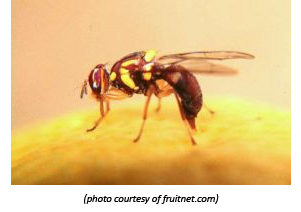Restrictions to protect New Zealand’s horticulture industry which went as far as posting officials in the fruit and vegetable section of a Whangarei supermarket have been lifted more than two weeks after a lone Queensland fruit fly was found.
 The Ministry for Primary Industries lifted all restrictions on the movement of fruit and vegetables in Whangarei yesterday evening but officials are still investigating how the fruit fly came to be in a trap in Whangarei on January 21.
The Ministry for Primary Industries lifted all restrictions on the movement of fruit and vegetables in Whangarei yesterday evening but officials are still investigating how the fruit fly came to be in a trap in Whangarei on January 21.
“We may not ever know for certain,” a spokesman for MPI told NZ Newswire.
In final checks yesterday MPI staff found no flies in 266 traps set up in a 1.5km radius from the original find.
Primary Industries Minister Nathan Guy said he was pleased the fruit fly was a solitary insect.
“This detection is a very rare event and shows we have a high performing bio-security system,” he said.
MPI’s deputy director-general of compliance and response Andrew Coleman praised the Whangarei community and Northland Regional Council for supporting the precautionary moves.
“Had this pest become established in New Zealand, it would have had serious consequences for our home gardeners, horticultural growers and the wider New Zealand economy.”
While the news will come as a relief to the horticulture industry, a Countdown supermarket in the controlled area is also freer to operate.
Shoppers who lived outside the controlled area were not allowed to buy fresh fruit and vegetables and two MPI staff were in the fruit and vege aisle at all times to help enforce the restrictions.
“While there has been some business impact in terms of sales and the time needed to help educate and inform customers, we are proud supporters of our New Zealand produce suppliers and recognise the significant bio-security risk the fruit fly presented,” a Countdown spokeswoman told NZ Newswire.
MPI will continue its surveillance programme, and 33 more traps have been left in high-risk locations near landfills and industrial areas.
Fruit and vegetables are New Zealand’s fourth-largest export earner at just over $2.5 billion – but trade was not impacted during the scare.
Source: 3 News
